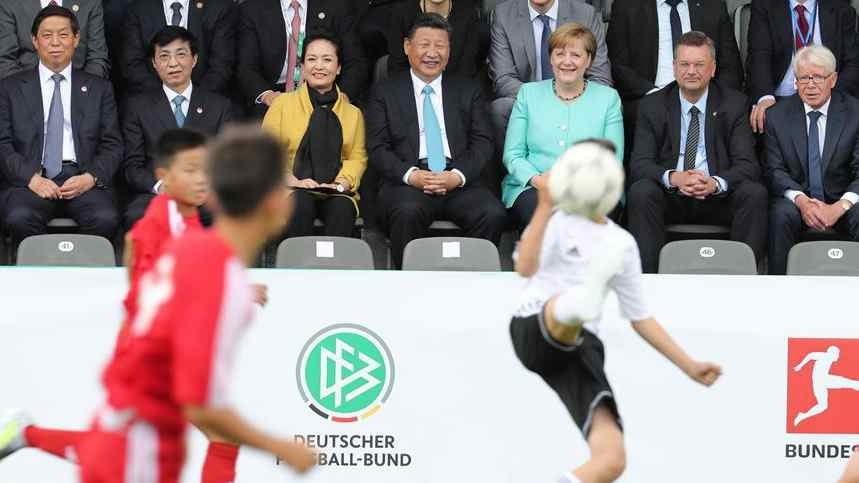Diplomacy is said to be the use of a velvet glove to mask a powerful fist, often applied in the shadows. For the cameras, however, it is encapsulated by photo opportunities, handshakes, and cultural exchange.
No more clearly was this on the show than in Germany last week, when the headlines from Chinese President Xi Jinping’s pre-G20 discussions with German Chancellor Angela Merkel were dominated not by trade talks – but pandas and football.
From zookeepers to goalkeepers
Diplomatic vessels take unusual shapes. Indeed, at the 2014 G20 meeting in Australia the leaders were given a koala to cuddle – and "koala diplomacy" was born.
Then Australian Prime Minister Tony Abbott and Russia's President Vladimir Putin each hold a koala before the G20 Leaders' Summit in Brisbane on November 15, 2014. /Xinhua Photo
Then Australian Prime Minister Tony Abbott and Russia's President Vladimir Putin each hold a koala before the G20 Leaders' Summit in Brisbane on November 15, 2014. /Xinhua Photo
And Mongolia is famous for gifting horses to visiting dignitaries (although most, including one given to ousted South Korean President Park Geun-hye in 2016, never leaves the country).
But panda diplomacy remains at the top of the tree, and the unveiling of Meng Meng and Jiao Qing by Xi and Merkel at Berlin Zoo on July 5 was a moment of consequence.
Panda diplomacy is a two-way street – entrusting the rare animal to another country is a symbol of faith, signaling the embrace of closer relations.
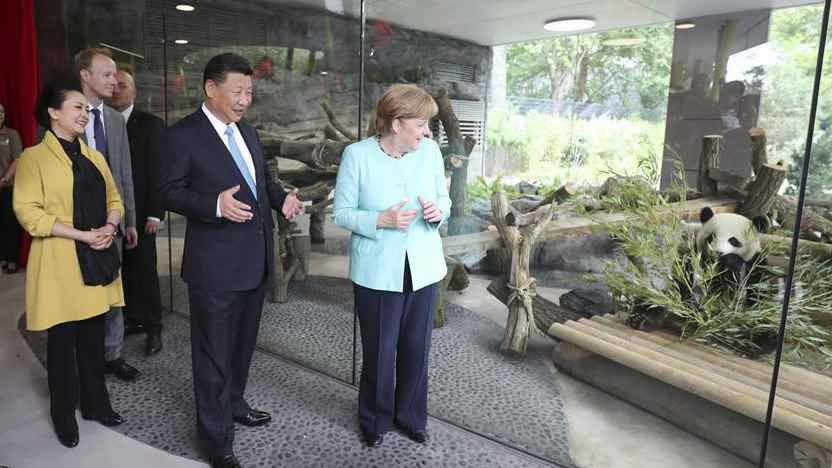
Chinese President Xi Jinping, his wife Peng Liyuan, and German Chancellor Angela Merkel visit the Panda Garden at Berlin Zoo in Berlin on July 5, 2017. /Xinhua Photo
Chinese President Xi Jinping, his wife Peng Liyuan, and German Chancellor Angela Merkel visit the Panda Garden at Berlin Zoo in Berlin on July 5, 2017. /Xinhua Photo
At one million US dollars per year, plus a 10-million-US-dollar purpose-built facility, the arrival of the bears is far from a cheap arrangement. But the outlays are expected to be offset by visitor interest and the wider benefits of the closer ties the loan symbolizes.
The other side to the diplomatic wooing in Berlin came later the same day, when Xi and Merkel were photographed smiling broadly as Chinese and German youngsters competed on the football pitch.
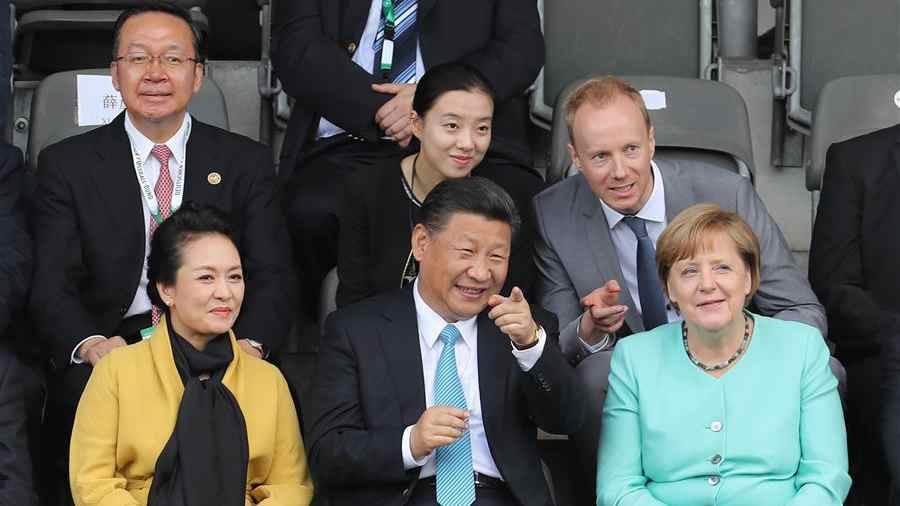
Chinese President Xi Jinping, his wife Peng Liyuan and German Chancellor Angela Merkel watch a friendly football match between Chinese and German youth teams in Berlin on July 5, 2017. /Xinhua Photo
Chinese President Xi Jinping, his wife Peng Liyuan and German Chancellor Angela Merkel watch a friendly football match between Chinese and German youth teams in Berlin on July 5, 2017. /Xinhua Photo
China, football and diplomacy
The use of football as a political tool is far from new, whether to further a campaign, find common ground between warring countries, or smooth the way for a better relationship.
Emmanuel Macron was pictured having a kickabout during the French presidential campaign, an Armenia vs. Turkey World Cup qualifier in 2008 was used as a starting point to restart diplomatic ties, and national leaders were sitting side-by-side as their countries battle on the pitch is frequent.
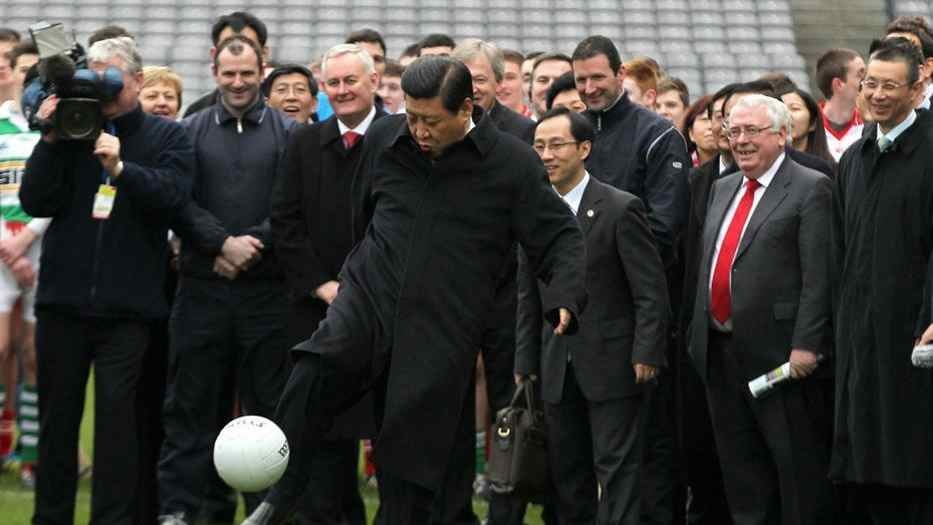
2012: Xi Jinping kicks a Gaelic football as he visits the headquarters of the Gaelic Athletic Association in Ireland. /Xinhua Photo
2012: Xi Jinping kicks a Gaelic football as he visits the headquarters of the Gaelic Athletic Association in Ireland. /Xinhua Photo
President Xi has long vowed to boost China's footballing prestige, but using the beautiful game as a conduit to the country's heart predates his arrival at the top table.
Former British Prime Minister Tony Blair came to China in 1998 and sought to improve cultural and business ties with a little help from a shared passion for football.
Speaking nearly 20 years ago, when the CSL was yet to be conceived and the EPL yet to hit the global saturation of today, Blair said Chinese football had great potential and offered British help develop the sport.
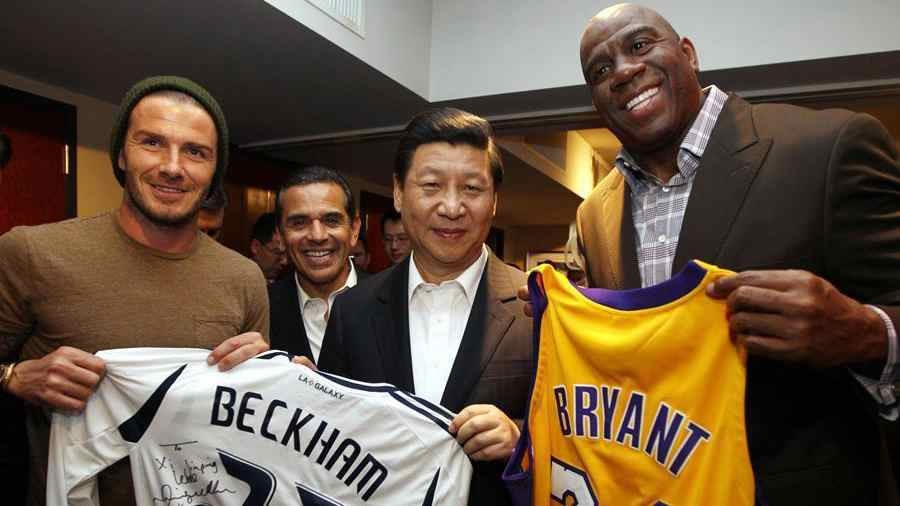
Xi Jinping, then Chinese vice president, is presented with souvenir jerseys by David Beckham and Kobe Bryant in Los Angeles, the United States on February 17, 2012. /Xinhua Photo
Xi Jinping, then Chinese vice president, is presented with souvenir jerseys by David Beckham and Kobe Bryant in Los Angeles, the United States on February 17, 2012. /Xinhua Photo
Fast-forward to 2015 and Xi, speaking in Manchester during a state visit to Britain, called for more exchange and cooperation on football between the countries. He also oversaw former China star Sun Jihai's induction into the National Football Museum's Hall of Fame.
In Berlin last week, Merkel followed up an agreement for a football partnership between the two countries struck in November of 2016.
While China has welcomed overseas players and Chinese businesses have taken stakes in clubs around the world, link-ups like those with Germany – focusing on development alongside foreign talent – look likely to be the future.
"In the new epoch of diversified diplomacy, a sport is believed to make things easier by enhancing intimacy among countries," Ruan Zongze, vice president of the China Institute of International Studies, told Xinhua.
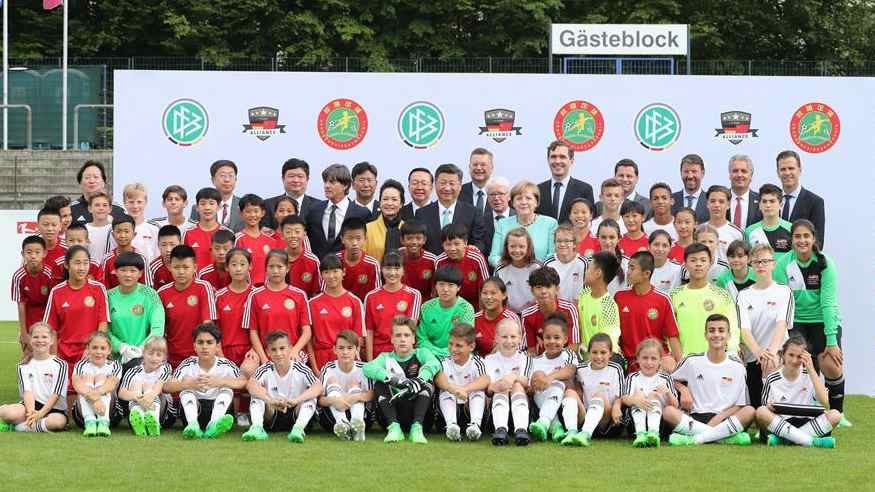
Chinese President Xi Jinping, his wife Peng Liyuan, and German Chancellor Angela Merkel with members of Chinese and German youth football teams in Berlin on July 5, 2017. /Xinhua Photo
Chinese President Xi Jinping, his wife Peng Liyuan, and German Chancellor Angela Merkel with members of Chinese and German youth football teams in Berlin on July 5, 2017. /Xinhua Photo
Sport has long been a way to find commonality – between peoples and countries. In the 1970s, ping pong diplomacy helped restore China-US ties.
Decades later, with China’s growing influence on the football stage across the world, the game will likely increasingly be used as a way to further diplomatic goals.

